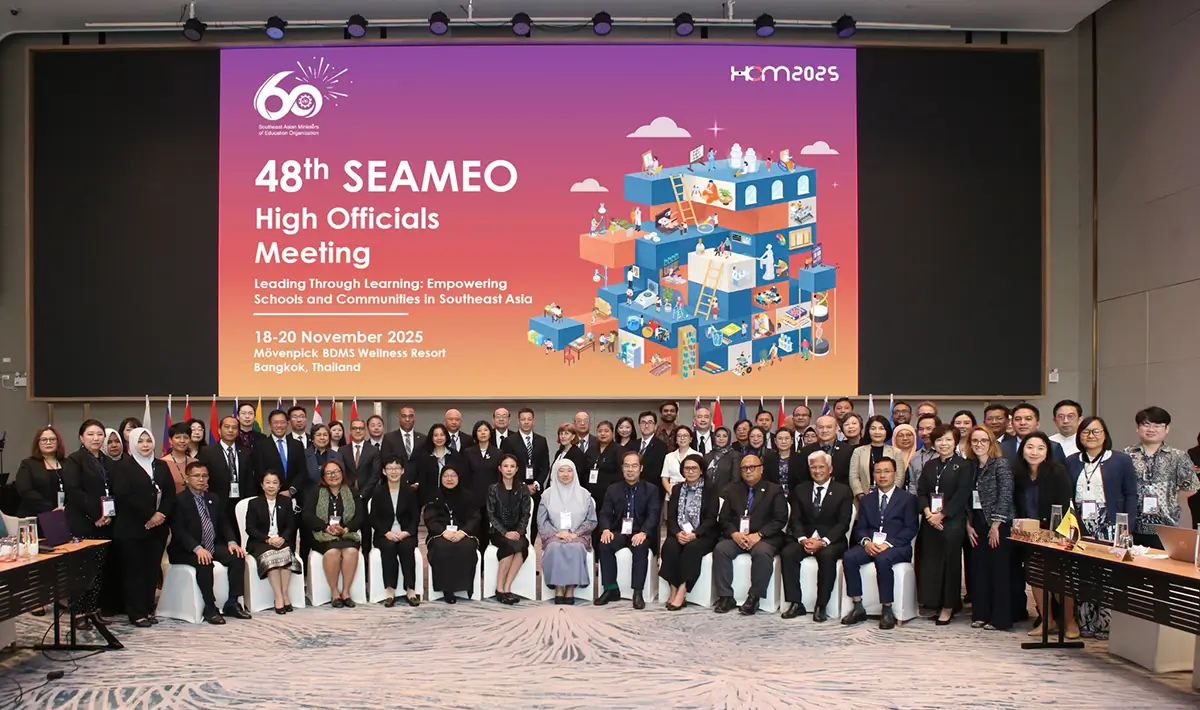BANGKOK, Thailand—The Southeast Asian Regional Center for Graduate Study and Research in Agriculture (SEARCA) actively participated in the 48th Southeast Asian Ministers of Education Organization (SEAMEO) High Officials Meeting (HOM) held in Mövenpick BDMS Wellness Resort on 18–20 November 2025, in celebration of SEAMEO's 60th anniversary.
Themed "Leading Through Learning: Empowering Schools and Communities in Southeast Asia," the meeting brought together over 150 delegates, including the 11 high officials from all SEAMEO Member Countries, along with representatives from Associate and Affiliate Members, SEAMEO Center Directors, and global partners to strengthen cooperation in education, science, and culture.
SEARCA was represented by Dr. Mercedita Sombilla, Center Director; Assoc. Prof. Joselito Florendo, Deputy Director for Administration; and Ms. Julie Ann Barril, Executive Coordinator to the Director.
During the in-camera session, SEARCA's updated 12th Five-Year Development Plan: Sustainable Transformation of Agricultural Systems through Innovation in Southeast Asia (SUSTAIN Southeast Asia) was formally approved, marking a strategic milestone in the Center's commitment to sustainable agricultural transformation.
Several SEARCA working papers were also confirmed, including those on Landscape Analysis of School Meals Programmes Implementedin Southeast Asia, which aims to assess the current state, document and compare good practices regionally and globally, and identify policy and implementation gaps to provide recommendations for harmonized school meals programs; and the Consortium for Agricultural Policy Research Initiatives (CAPRI), which is a platform for evidence-based agricultural policy innovation in Southeast Asia. Another paper confirmed was on the Southeast Asia Agricultural Outlook Series (SEA Agri Outlook Series), which will analyze ongoing agricultural transformation and propose solutions to key challenges in the region.
Sombilla also reported on SEARCA's Rice Straw Biogas Hub (RSBH) project, which transforms rice straw into biochar and compost for soil regeneration, substrate for food and feed production, and feedstock for clean energy. Singapore commended the project, recognizing it as a model of education-driven eco-innovation. The project's success in converting rice straw waste into clean energy and increasing farmers' income exemplifies the Center's impact-oriented, community-centered approach to innovation and its potential for regional scaling.
Furthermore, Sombilla joined the SEAMEO Gallery Walk, showcasing SEARCA's Erasmus+-funded project Postgraduate Micro-Credential on Food Security and Climate Change, designed to develop, pilot, and institutionalize micro-credentials in food security and climate change throughout the region. She also participated in special sessions on school leadership and artificial intelligence alignment across Southeast Asia.
On the final day, Florendo represented SEARCA at the SEAMEO Inter-Centre Collaboration (ICC) Partnership Coordination Meeting led by the SEAMEO Regional Centre for STEM Education (STEM-ED). This session gathered SEAMEO Centers and partners, including the United Nations Educational, Scientific and Cultural Organization (UNESCO) Office for Climate Education, to explore joint strategies for advancing STEM and climate change education across the region.
This year's HOM reaffirmed the commitment of SEAMEO Centers, member countries, and partners to advancing education, science, and culture for over 650 million people across Southeast Asia. As SEAMEO's center of excellence in agriculture, SEARCA is aligning its initiatives under SUSTAIN Southeast Asia with the SEAMEO Strategic Plan 2021–2031, promoting education and development, especially in agriculture, rural development, and innovation.
